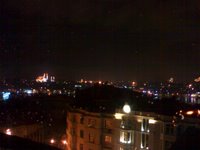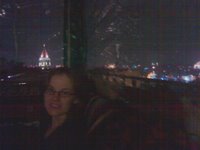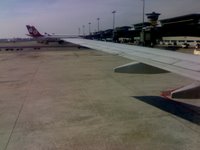 Helsinki-Istanbul-Brussels all night long -- at least for the last few days. I spent (too) few but very fruitful days in Istanbul. I am part of the Aspectacles group which will start making multimedia / video art pieces which challenge our ideas and conceptualization of things. One of our core members is from Istanbul and Turkey will be one of the junction points of our work dealing with cultural stereotypes and prejudice.
Helsinki-Istanbul-Brussels all night long -- at least for the last few days. I spent (too) few but very fruitful days in Istanbul. I am part of the Aspectacles group which will start making multimedia / video art pieces which challenge our ideas and conceptualization of things. One of our core members is from Istanbul and Turkey will be one of the junction points of our work dealing with cultural stereotypes and prejudice.I am qualified to discuss about prejudices as I had very strong opinions about Turkey until May 2006. I hadn't been there but of course I knew about 'sun&sand' charter trips to Alanya, human right issues and stories about Turkish men selling leather jackets, carpets... After visiting Istanbul for two times I have to say that I am enchanted by that city. I hope that Aspectacles will stir up the discussion further as well as open new viewpoints to foreign cultures and peoples more generally.
Turkey is not that backward country as many of us still think. It is true that Turkish media is heavily monopolised. Almost all of the major dailies are owned by a few cross media groups and it is highly nationalistic. The Doĝan Group, the largest and the most prominent of these media giants, owns a substantial part of the media landscape in Turkey: The major dailies Hürriyet and Milliyet, “the most selling” boulevard daily Posta, the quality paper
 Radikal which has liberal and left-wing authors, the sports daily Fanatik, the business daily Referans and the English daily Turkish Daily News are all owned by this giant media group. The other major player in the media business the Merkez Group too has a quite large share in the media market. The mainstream Sabah which competes with Hürriyet, the most prominent regional newspaper Yeni Asır, the boulevard paper Takvim and the sports daily Pas-Fotomaç do belong to the Merkez Group.' (Source: Media Landscape Turkey) There are still a number of issues to be dealth with -- one accelerator is EU.
Radikal which has liberal and left-wing authors, the sports daily Fanatik, the business daily Referans and the English daily Turkish Daily News are all owned by this giant media group. The other major player in the media business the Merkez Group too has a quite large share in the media market. The mainstream Sabah which competes with Hürriyet, the most prominent regional newspaper Yeni Asır, the boulevard paper Takvim and the sports daily Pas-Fotomaç do belong to the Merkez Group.' (Source: Media Landscape Turkey) There are still a number of issues to be dealth with -- one accelerator is EU.Now I am at Brussels. Tomorrow I will join the Networked Audiovisual Systems Concertation workshop. At least one link between these two subjects is that Turkey is an EU candidate. EU has stated several requirements for the media in Turkey, e.g. prison sentences for journalism related offenses were replaced with heavy fines. Penalties of banning newspapers and the distribution of the newspapers and shutting down the media outlets were repealed. However, despite these improvements 157 journalists, publishers and human rights activists were prosecuted in 2005 for expressing their ideas. 29 of them were charged with “insulting the Turkish identity, the Repub
 lic and the institutions of the State” while 17 journalists commenting on the human rights issues were accused of “influencing the court decision” and “attempting to influence the fair trial”. 12 journalist-writers were charged with “disseminating terrorist propaganda” based on the TCK (Turkish Penal Code) or the anti-Terrorism Law. 15 journalists/human rights activists were charged with “inciting hatred and enmity or humiliation” based on TCK (Source: Media Landscape Turkey).
lic and the institutions of the State” while 17 journalists commenting on the human rights issues were accused of “influencing the court decision” and “attempting to influence the fair trial”. 12 journalist-writers were charged with “disseminating terrorist propaganda” based on the TCK (Turkish Penal Code) or the anti-Terrorism Law. 15 journalists/human rights activists were charged with “inciting hatred and enmity or humiliation” based on TCK (Source: Media Landscape Turkey).While the general media scene is still somewhat under (EU's) pressure, networked, audiovisual ways of communication: blogs, podcasts, online comics and other websites are raising different viewpoint to issues under discussion. Art will be just another way of challenging people's ideas and raising up new topics into discussion. I strongly believe that besides EU pull there will also be civil journalism/media art/blogger push to expand our thoughts and shake the stereotypes. Aspectacles will do its best to contribute :)



No comments:
Post a Comment